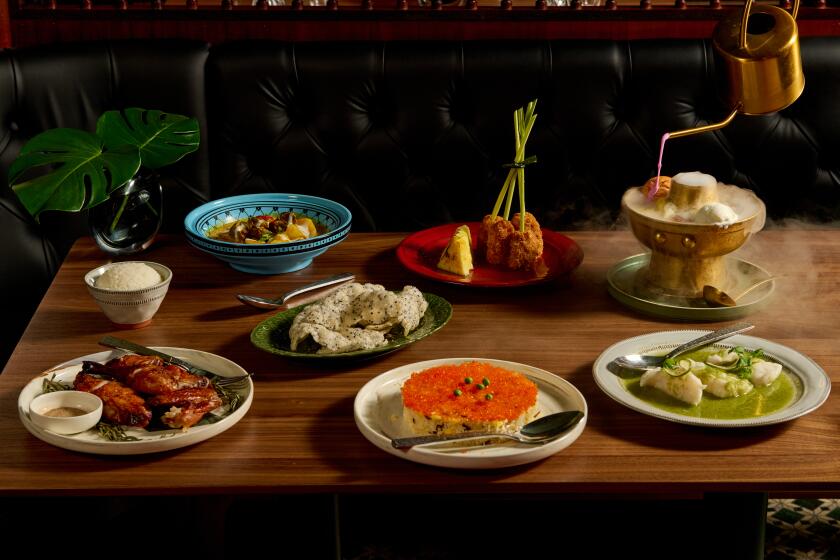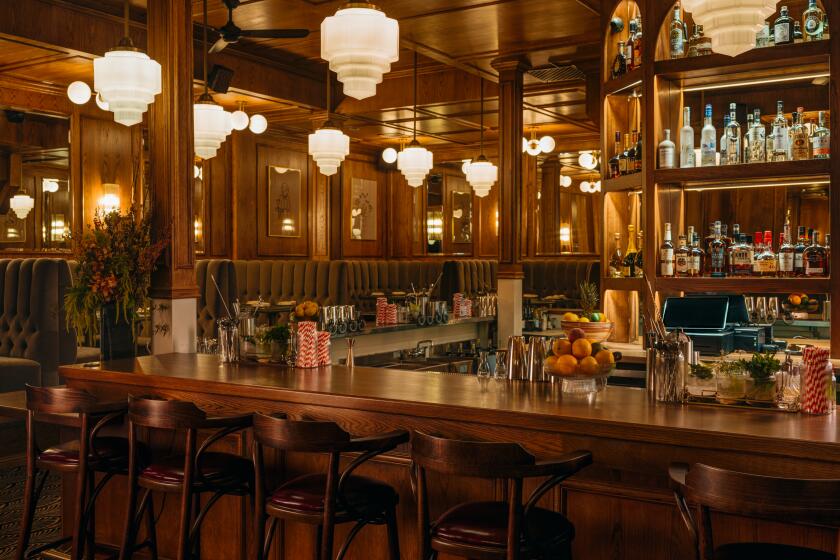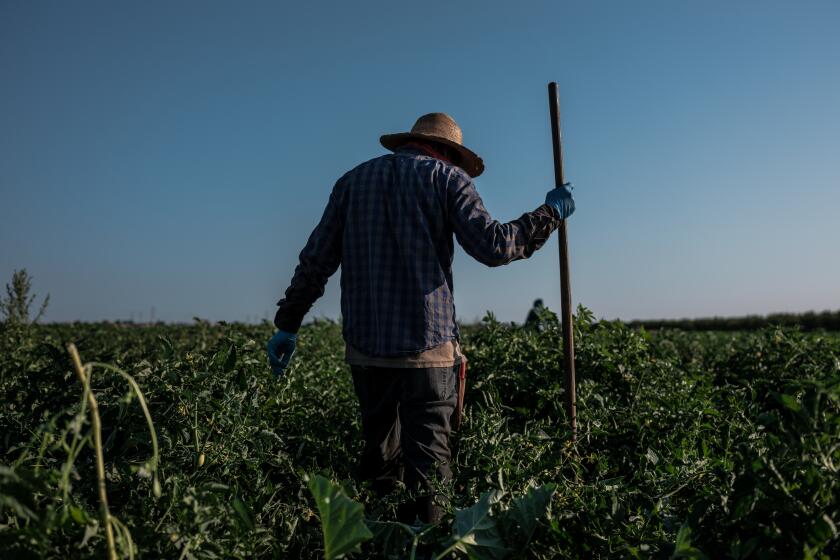Sambo’s Owner Plans Comeback for Eatery
Tucked away on the beachfront rests a small restaurant where the waitresses wear floral print shirts and green half aprons, the coffee is cheap and children can order Mama Mumbo’s French toast and Papa Jumbo’s favorite. Seven panels line the wall showing the story of a child and a tiger. The sign outside reads “Sambo’s” in plain black letters.
The Cabrillo Boulevard restaurant has operated for four decades and remains the last standing testament to what was once a nationwide chain that flourished in the late 1950s and ‘60s.
Ten years ago, the chain succumbed to financial mismanagement and heated opposition to the restaurants’ name by civil rights groups, which said “Sambo” was an unacceptable racial stereotype.
Now, the once successful and controversial Sambo’s is planning a comeback.
Chad Stevens, the Santa Barbara restaurant’s newest owner and grandson of co-founder Sam Battistone, wants to revitalize the sleepy eatery, bringing the original site back to its former financial glory and slowly relaunching the chain.
But renewed promotion of the Sambo’s name, some say, will create the same essential problems encountered 20 year ago.
“It’s racially insensitive,” said Jeffrey T. Sammons, a professor of history at New York University who remembers the years of Sambo’s national expansion. “Sambo was a cartoon when I was a kid, and it was little black Sambo who represented black innocence, backwardness and a comedic quality. . . . It demonstrated a tremendous disregard for the humanity of black people. There is no way that they cannot know that this is problematic.”
Hyping Sambo’s is far from harmless, agreed Robin Kelley, visiting professor of literature at Stanford University, “because of what Sambo means for the 20th century.” The image, he said, “will always be linked to the stupid, shuffling black male. And no matter what they do, it will never be OK for a white man to operate a Sambo’s.”
Author Helen Bannerman introduced America to the character of Sambo in 1899 with her children’s book “The Story of Little Black Sambo.” In the book, the eponymous hero outsmarts a greedy tiger that eventually turns into butter, which is then poured onto a stack of pancakes. Though the setting was India, the pictures that accompanied Bannerman’s text--of a dark mahogany boy with wild nappy hair and big red lips--eventually transformed him into a stereotype of happy-go-lucky blacks in the American South. By the 1920s and ‘30s the term “Sambo” had become a racial stereotype.
The restaurant name, however, began innocently enough.
It was the idea of Battistone and his partner Neil “Bo” Bohnett, who put their heads--and names--together to create Sambo’s.
Then the pair took the children’s story as their theme and eventually expanded the Santa Barbara eatery into a 1,200-outlet franchise. But when Battistone died in 1991, only the one restaurant--with moderate business--remained.
“It will be a dream come true to resurrect something that my family built,” said Stevens, the only one of Battistone’s 16 grandchildren in the restaurant business. Stevens plans to begin by setting up a World Wide Web page for the restaurant, marketing Sambo-related merchandise and launching a major advertising campaign to remind former and future customers that the eatery still exists and should only grow.
The resurrection, Stevens acknowledged, will depend on how the eating public receives the name.
Stevens said that he recognizes the weight the term holds, but that it was never intended to harm.
“It’s a fairy tale,” he said. “In the late ‘60s and early ‘70s, it was a very sensitive time. There was a sense of political correctness and militancy. . . . Sambo’s got caught up in all that. But Sambo’s was not a political issue; it was just the names of the two founders.”
Since the demise of the chain, which once reached into 48 states, the Santa Barbara restaurant has done little advertising and received few complaints about the name, employees say.
“Mostly people are just curious,” said Sambo’s waitress Katherine Robinson. “They don’t usually have a problem. It’s just that people perceive the company went [out of business] because of the name. They ask, ‘How come you haven’t had to change it?’ I guess at one time it had a negative connotation, but most customers don’t bring it up.”
Stevens said his grandfather’s intention was never to make waves, just to provide families with quality food at a reasonable price.
Battistone grew up in rural Pennsylvania, the son of coal-mining Italian immigrants. He moved to Santa Barbara at the tail end of the Depression, looking for a way to establish himself. He worked as a busboy, waiter and manager in a host of California restaurants before meeting Bohnett and deciding to build something he could call his own.
With their earnings, the pair opened the first restaurant--on the Cabrillo Boulevard site--in June 1957. They later copyrighted the Sambo’s name and story for use in their family-oriented business.
As the chain expanded across the country, the concept “played in Peoria,” but once the restaurants reached into the East, resistance among black leadership intensified.
“Sometimes the Sambo’s thing got them into hot water,” remembered Joe Prevedello, who worked with the chain beginning in 1968. “Somewhere between Michigan and Florida we got hit pretty hard.”
By the late ‘70s, several Eastern states had gone to court over the issue of whether the chain should change its name. The Urban League and chapters of the National Assn. for the Advancement of Colored People in Connecticut, Rhode Island and New York asked for an official name change if the restaurants were to remain open.
After the Rhode Island NAACP and the Urban League’s Providence chapter filed a complaint in 1978, that state’s Human Rights Commission decided that “the use of the name ‘Sambo’s’ had the effect of notifying black persons that they were unwelcome at Sambo’s restaurants because of their race.” Battistone stuck by his contention that Sambo’s did no harm, but in some places adopted the names The Jolly Tiger or No Place Like Sam’s. In some Southern locations, the restaurants were called No Place Like Sam’s from the beginning.
While the racial controversy brewed, the chain was experiencing severe money problems. Its demise had more to do with financial mismanagement than with African American opposition to the concept.
The late ‘70s proved a difficult time for Sambo’s Restaurants Inc. A restructuring of its managerial investment program led to a walkout of 600 managers in 1979. The corporation’s lenders replaced Battistone as chief executive of the company. His successor was later sued for $8 million for allegedly funneling money away from the company into his cattle-ranching scheme.
The franchise eroded further with health code violation fines and a copyright infringement suit by Dr Pepper over a Sambo’s jingle. By 1982, most of the restaurants had been sold, and the corporation was forced to file for bankruptcy.
Sambo’s aficionados and employees are hoping that Stevens’ business savvy will reestablish the restaurant and lead to an eventual renaissance of the chain. He has already turned his first Santa Barbara eatery, Chad’s, into a success.
For Stevens, playing up the Sambo’s theme is simply a business decision.
“My main goal a year ago was to change the name,” he said. “I thought we would have to drop it. But then people came in here and wanted to buy the Sambo’s memorabilia. It started making me think that this was a valuable brand.”
Stevens said he is ready to take customer surveys to help determine what they want to see in the restaurant. “If we get complaints about the name in the future,” he said, “that’s something we’ll think about and deal with.”
Professor Sammons said the current cultural climate allows places such as Sambo’s and Hooters, another controversial restaurant chain that some women find offensive, to go unchecked.
“You have to weigh the questions of group sensitivity over personal satisfaction,” he said. “The owners [of Sambo’s] obviously have some connection to the name, and this seems to be saying that their personal choice in this name is going to be more important than the right of the group--in this case black people--to not be subjected to this.”
More to Read
Eat your way across L.A.
Get our weekly Tasting Notes newsletter for reviews, news and more.
You may occasionally receive promotional content from the Los Angeles Times.






